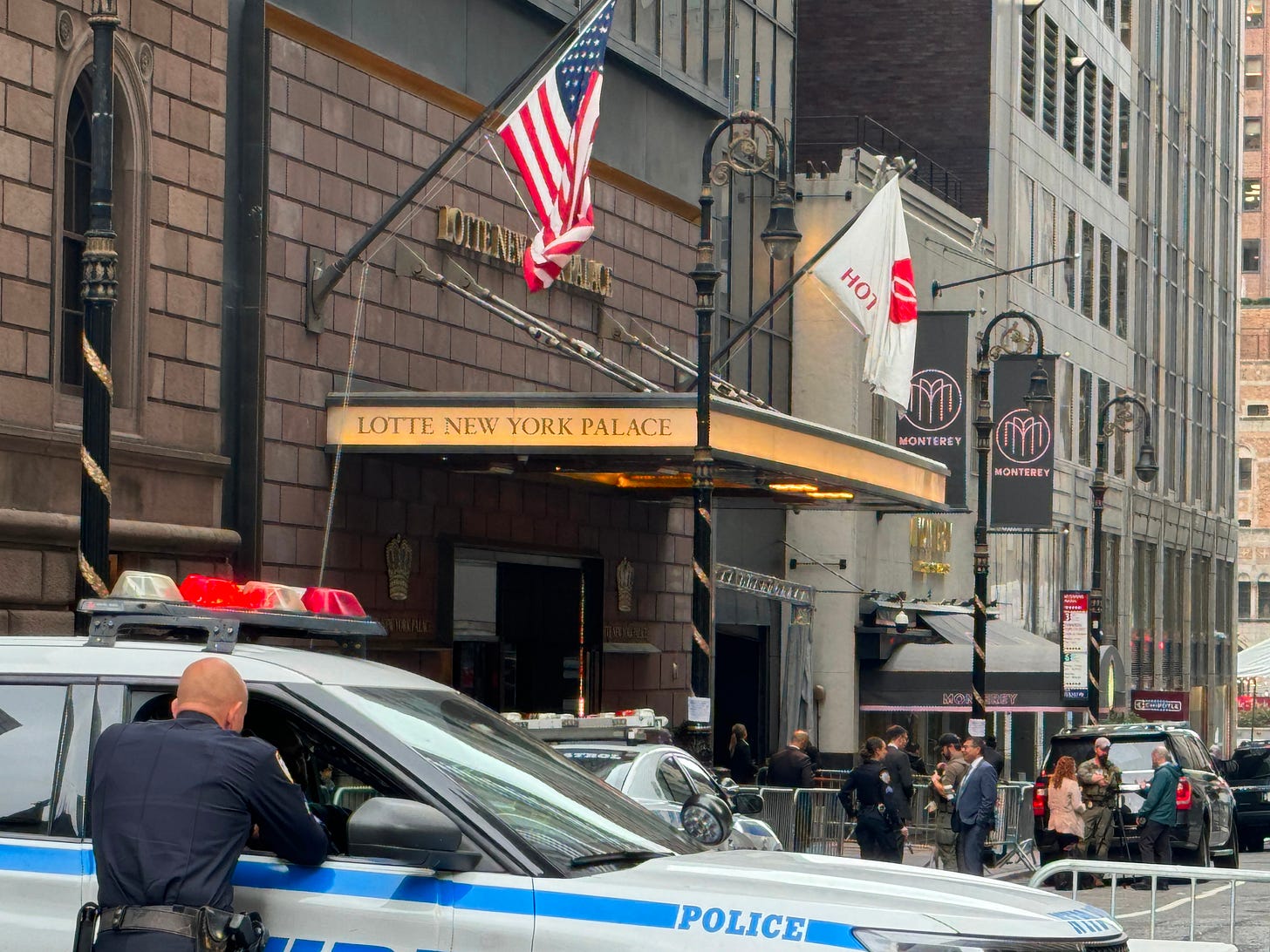“It's like the Super Bowl,” a U.S. official tells me. But the field isn’t covered in grass or AstroTurf: It is concrete sidewalks blocked off, security standing on every corner, and an ever-present honking outmatched by a stream of foreign pedestrians, sporting their badges and pins. We’re talking about this week in New York City, as the United Nations General Assembly takes place. “It's a target rich environment,” says the official, who once worked in counterintelligence at the FBI.
The 79th session is the first since the Israel-Hamas war began and the last where Joe Biden spoke as president. And it comes as a shadow casts deeper across the world — Ukrainian President Volodymyr Zelensky warned the UN that Russia is planning to attack Ukraine’s nuclear plants. Hezbollah launched its first ballistic missile at Tel Aviv, unsuccessfully targeting Mossad’s headquarters after the pager/walk-talkie attacks. And China made the rare announcement that it test-fired an intercontinental ballistic missile which landed in the Pacific Ocean. All of that just on Wednesday.
But what happens outside of UNGA’s General Debate, four days of leaders airing grievances without the promise of progress, may hold more value. At least to some in the intelligence community. Suddenly, New York’s diverse ecosystem of spies receives some 140 heads of state, and “they bring in a whole nother flock of them,” the official told me. The FBI “is going to be licking their chops.”
Two more retired counterintelligence agents said the FBI’s New York field office spends months preparing for UNGA. Both say the bureau tracks who will attend, getting names from the State Department, where diplomatic passports of UNGA visitors are processed.
“Then it's, ‘Do we have any interest in any of these names here?’” one source said. “There are individuals coming from across the world that the intelligence community is aware of and wants to get closer to, to see if there are chances of vulnerabilities or recruitment opportunities… Who knows who is coming from these other countries that have relationships with Hezbollah and Hamas that would be of interest?”
What happens next is played out in the city’s sidewalks, cafes, restaurants, bars, and hotels. Maybe not at the Waldorf Astoria, which is owned by the China-based Anbang Insurance agency, but certainly at the lavish Lotte New York Palace, where numerous high profile visitors stay.
The hotel hosts more than 20 diplomatic delegations for UNGA, according to Lotte’s website. Guests have to get through police barricades and then the hotel’s security screening. Inside, they could shuffle into a mirrored elevator crowded with Americans, Chinese, or Vietnamese officials. Or they could get a cocktail in the Gold Room, with its gilded glow and vaulted ceilings.
And so comes the bump. “‘Okay, the guy likes eating at restaurant X in New York when he comes into the country, and so you get guys in there to go eat there and try to make contact,’” I’m told.
I sat in the Gold Room with tuna tartare, watching and waiting. I don’t know what I expected to see, but I definitely did not see it. A foreign official I know, who said he heard everything was bugged at UNGA, met me there after dinner. And a besuited man at the table next to us eavesdropped overtly on our conversation, nodding in agreement at times.
Beyond recruiting, the sources said the intelligence community also uses UNGA to try to fill in intelligence gaps of high priority. The FBI may request enhanced legal authorities to collect intelligence — such as installing listening devices in hotel rooms or vehicles, and monitoring electronic communications. The process of obtaining FISA court orders could take months and a lot of effort, as an agent must show probable cause to believe that a person is acting on behalf of a foreign power.

And some retired agents believe the FBI, with its limited resources, goes too far on UNGA. “There's due diligence and then there's going overboard,” one of the former counterintelligence agents said. “I've seen them go overboard.”
He didn’t see the reason why. “It's very unlikely to result in a recruitment or any actionable intelligence,” he said.
Not that the likes of Iranian President Masoud Pezeshkian or Russian Foreign Minister Sergei Lavrov, who both attended UNGA, would expect anything less. Indeed, collection on some targets may take decades and involve multiple countries, building complex dossiers throughout the person’s career.
All three sources left open the possibility that the Chinese, Russians, and Iranians are engaging in soft spying of their own while in New York, despite the rigid security —hundreds of cameras, restricted waterways, sidewalks with members of the Secret Service, UN Security, and the NYPD.
China may try to bump a foreign official. “If they wanted to bump a Russian official to develop someone in Russia, I guess that would be an opportunity,” one source said. He had never seen it happen and believed there may be more to lose than gain.
“Russia's going to have too many eyes on them,” another source said. “I think they would use this as an opportunity to get close to their allies or to continue in their PR of why they're doing what they're doing, trying to convince other countries, using this as an opportunity to block in any way any kind of resolutions.”
The gamble comes as the Biden administration tries this week to gather pledges from other nations not to misuse commercial spyware.


